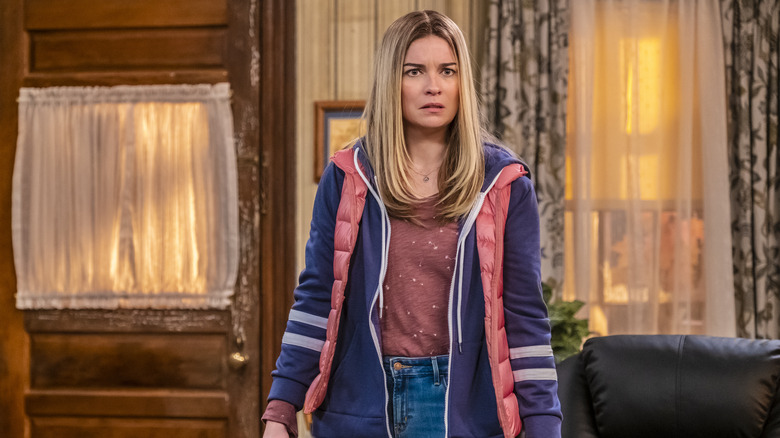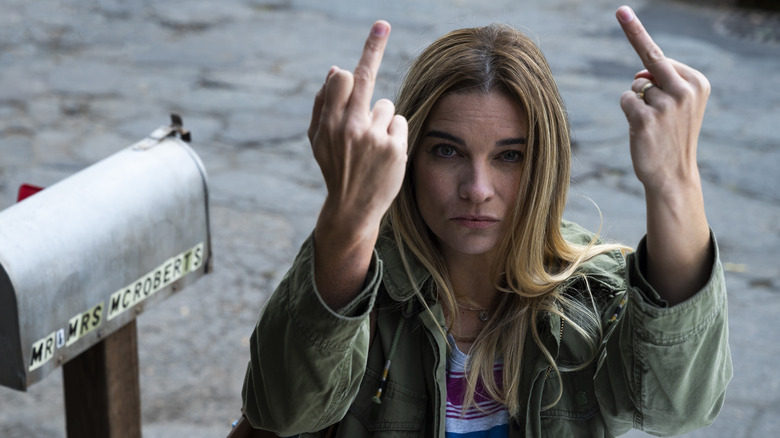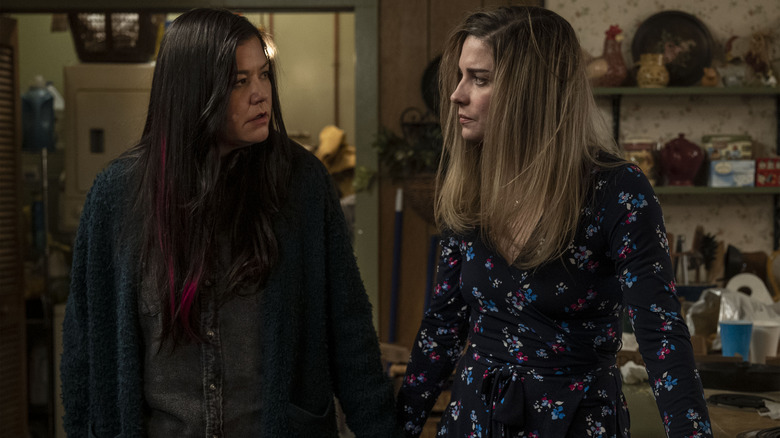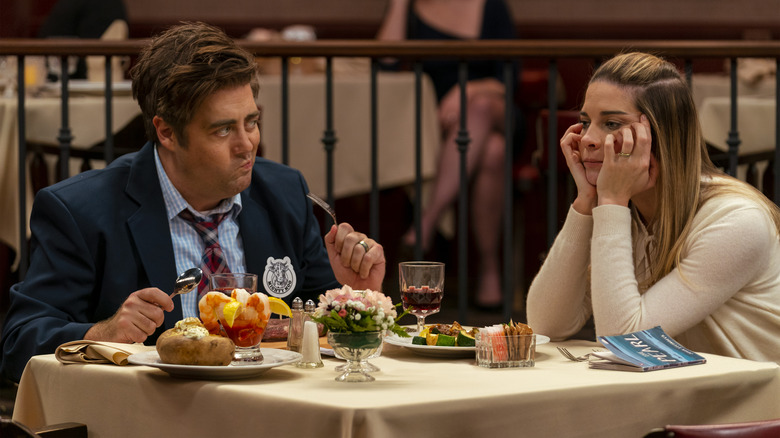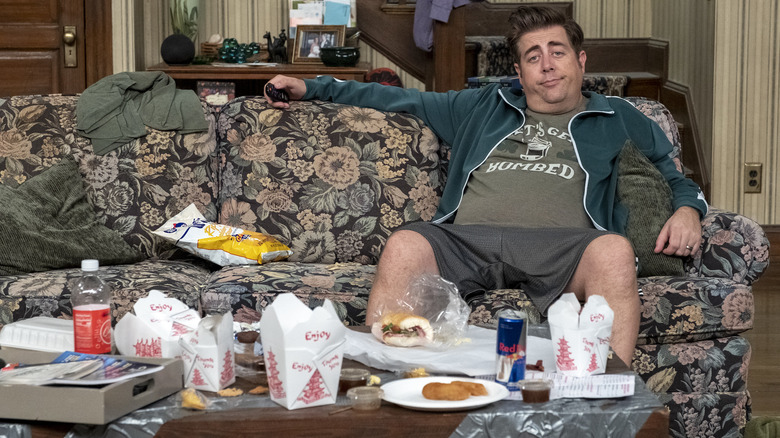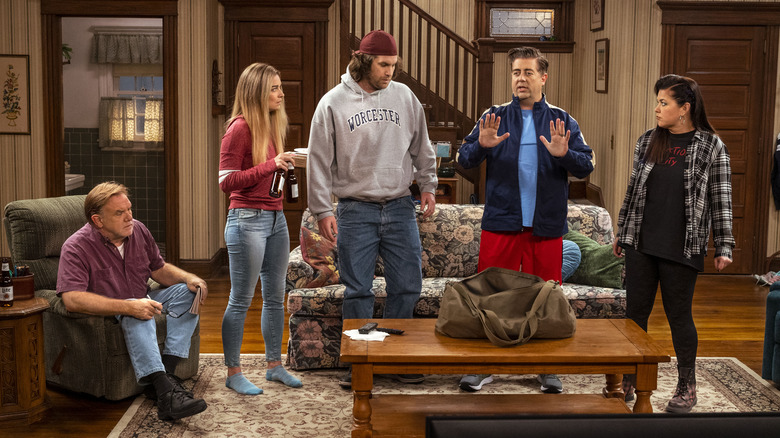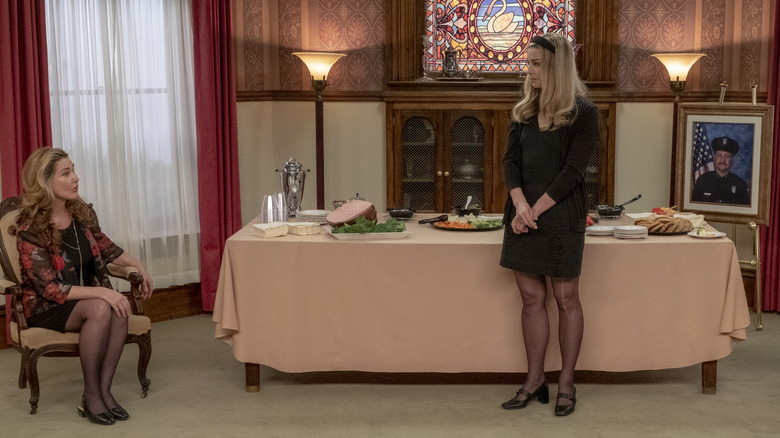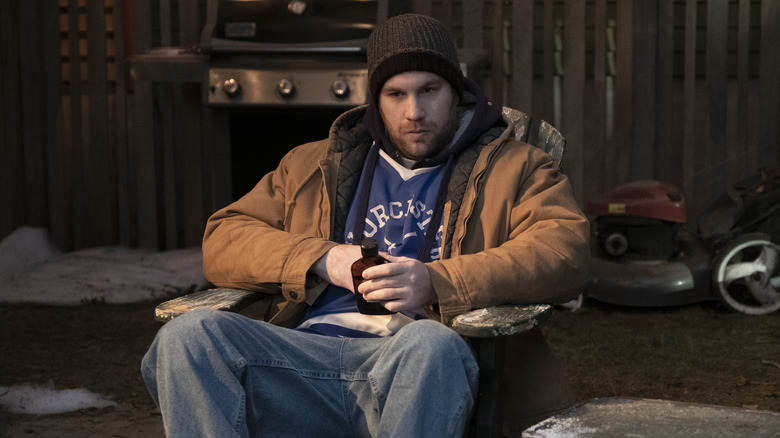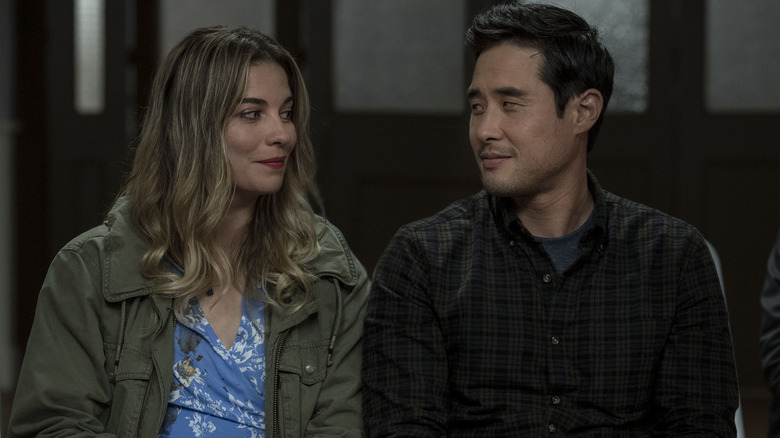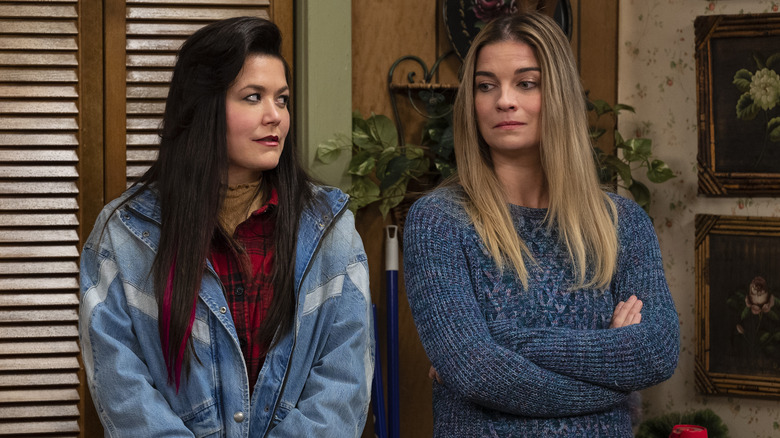Kevin Can F*** Himself Creator Valerie Armstrong Reflects On The Series Finale, Frasier, & More [Exclusive Interview]
(Note: This article contains spoilers for the series finale of "Kevin Can F*** Himself." Please proceed with caution.)
There are many lenses that you can look through to view your life. You might look at things as either half empty or half full. It's possible that you could only see things blissfully through rose-colored glasses. And in terms of television, you might look at your life as a multi-cam comedy with a laugh track or a serious single-camera drama. But for Allison McRoberts in AMC's acclaimed show "Kevin Can F*** Himself," she experiences her life both ways thanks to her unhappy marriage to an insensitive, unambitious man-child.
For two seasons, creator Valerie Armstrong and her team delivered a wildly unique and original story about a sitcom wife with real-world problems. On October 10, 2022, the series finale aired on AMC and the world (both ours and Allison's) finally got to see how truly terrible the titular Kevin really is. Now that the show is over, we got to sit down with Armstrong to look back on the entire series. In this exclusive interview, we cover the original plans for the story, the intricacies of some of the fan-favorite characters and relationships, and the show's final message for the audience. We also discuss the shows that inspired this one (aside from "Kevin Can Wait"), the logistics of the set, and the pivotal moments and curveballs in the finale that the entire series has been building towards.
'I am so happy with the result'
This interview has been lightly edited for clarity and brevity.
Now that "Kevin F*** Can Himself" is over, how do you feel about the finished results? Did you get to tell the complete story you were looking to tell?
I really did. I wasn't planning on it only being two seasons, but I got really good fair warning that it was our last season. I knew always how I wanted to end it, sort of the feeling that I wanted to leave off on, the last sort of shot I wanted to have. And so once we found out that the second season 1 was our last, we had what we had already broken. We had what we had left off on in season 1, and I knew now very definitively where I wanted to end it. And so we sort of merged them together and changed some things about the season and the story we were ultimately telling about Allison and Patty and everyone else. But I am so happy with the result. I really am.
How many seasons did you initially plan for the show to be?
I didn't have any sort of set map to it, especially because when you're working with a team and a network and a bunch of other opinions in the room, you have to be willing to adjust and throw out ideas and come up with new ones. We had a few different conceptions of what the second season of this show might look like that we went through, until we ultimately ended up where we are. And so if I had some sort of definitive four-season plan, I don't know what I would've done when they said, "Yeah, we don't like the second season. Please reconsider that."
I think in my head it felt like a three-season story. I wasn't sure what those would be necessarily, but I also am really grateful that I feel like we told a complete story in the amount of time that we had. And I don't feel like we had the chance to overstay our welcome.
'They're soul mates. They're each other's person'
What were some of the biggest changes you had to make in the story once you found out that you were only getting two seasons?
I believe our second season originally ended where episode 7 ends right now. Allison actually gets out and fakes her own death. And that's sort of where we [were] going to start our third season. Because as a viewer, and I always try to come at writing from that standpoint [...], I think I would go through the entire second season thinking she's not going to do it. Just like you go through the first season thinking she's not going to kill Kevin. And to end the second season with her actually faking her own death and getting out, I was very excited about that. But then when they told us it was our last season, I knew that couldn't be the end because that's running away. She hasn't actually dealt with anything that she needs to. It's a step forward. It's self-sacrifice.
She finally figures out that she wants to stay in Worcester. And then rather than giving that to herself and being happy, she sacrifices everything to save Patty. That's movement. And I really enjoyed that, but I didn't want to end it there. I thought ending with her and Patty separate just broke my heart because they are best friends. They're soul mates. They're each other's person.
I knew I had to kill Kevin. Kind of promised it. I knew pretty early on that Allison couldn't do it because that would show just no growth to me. You start the show with her wanting to kill her husband. And then she kills her husband. There's no movement there. There's no arc to it. The biggest arc possible for her would be to actually be able to say, "I'm leaving you. I'm leaving you and I hate you. I've hated you for a long time. I just never said anything," because that's what she's completely unable to do at the start of our show is have that sort of bold conflict with this man. So yeah, I knew that I wanted to get there. We had a few different versions of the ending that we talked over, that we pitched that we changed and altered and I'm really happy. I'm really happy with where we ended.
'He is worse than he looks. He just hasn't been pushed that far yet'
I remember watching and saying, "No! She's not going to fake her own death?" So I had a very audible moment while watching once it was going that way. But I love that the arc involves her going back, because Allison actually tells Kevin all of the things that she needs to tell him in the end. You don't get that ever, really.
I knew that scene would be cathartic. It's everything. It was a lot of pressure because it's like, what would you want her to say to him? Starting in the pilot, you're begging for her to stand up for herself and she finally gets to in that scene [in the finale]. It was heavy to write, but what was also really, really important to me in the latter half of that scene, [which] starts in multi-cam and it ends in single-cam, I wanted to make sure in that scene that we proved Allison right. She's been saying this whole time, "Everyone's telling me to just leave, to just leave this guy, to get a divorce. It's not that easy. And he's darker than everyone realizes. He's capable of more than anybody gives him credit for. Think about the way he treated the mail woman. Think about the way he treated me when I got a job. He is worse than he looks. He just hasn't been pushed that far yet."
In that moment, [Kevin] realizes that she's serious, that she left, that she is leaving him, and [is] going to make him look like an idiot and feel like an idiot. That's when he's pushed over the edge into that area where she has said he's been capable of going this entire time. No one believed her! He's not a different guy. He hasn't suddenly changed. He's just been pushed in a way that nobody has dared challenge him his entire life. And so the second half of that scene is like, "Oh yeah, it's not going to be that easy." He says, "I'm going to f***ing destroy you." He means it. And then he's hoisted on his own petard, which is a phrase that I have only heard in writers' rooms and never outside of them.
I think I've only ever heard that phrase in screenwriting class.
We used it a lot in the writers' room of "Masters of Sex." I think that was the first time I heard it.
'This is creepy enough as it is'
Coming out of the sitcom fantasy is a pretty big deal for Patty and Neil, but Kevin making the transition is the ultimate moment we've been building up to for two seasons. What was that moment like from conception to execution and how did Eric Peterson and Annie Murphy react?
We shot the multi-cam half first. We didn't have the audience in the room for that bit because I just didn't want to worry about them. I knew that we could manufacture what we had to and the audience reaction in that multi-cam scene has a very clear journey to it. In my mind, it starts off with them agreeing with Kevin like, "Ha, ha, she's joking. How funny is this?" It slowly turns into ... she says, "I left, I'm leaving you," and one woman goes, "Whoop!" And then everybody else is a little unsure what to do. Then there's a murmur. It gets more serious and he says, "You don't want to do this." And she laughs and says, "Of course I do." And the crowd is like, "F*** yeah, we're on your side!" It's like, she's gotten them over to her side and then it snaps.
Shooting the single-cam part, I remember the crew that day. The set is so different when you're in that single-cam living room from when it's open and bowed out and bright. When you're in there in single-cam, it feels like a real living room. It is dark. It feels like every East Coast living room I went into in high school. And I remember the crew being like, "Whew." Just seeing him up close, that was unsettling enough. I remember telling Eric ... he did the first couple takes a little menacing, or maybe it wasn't even menacing, but just in a lower register than he usually does Kevin. I said, "Listen, the camera is doing so much of the work for you. Let's try it as multi-cam Kevin, with that same sort of bright, 'everything's fine' delivery because it's at odds with what we're seeing and it's very creepy." That's exactly what he did and that's exactly what we used.
You see he's the same guy, but as he's walking towards her and invading her space and invading the camera, it was really unsettling on the day and I find it really unsettling in the scene. I'm really proud of it. I thought they both did an incredible job. Annie in that scene, I just want to clap for her the entire time. Not because it's easy. Not because she's like, "F*** you, I'm out of here." But because it's hard. And you see on her face how hard it is to keep standing up for yourself in those moments. She gets out of the house and I just want to give her a giant hug. I think she's brilliant in that scene, too.
Oh yes. I was like, "Oh, Kevin is scary now." Some lighting changes, but he's exactly the same.
That's right. We had some stuff in there that we ended up trimming back, stuff that made him seem more menacing, that in the edit you were like, "We don't need it. We don't need him to do anything more. This is creepy enough as it is," and we wanted to make sure he was still the same guy we always saw.
'They would theoretically be paid to laugh'
Regarding how different the set is in multi- and single-camera, I was curious about how things worked logistically. What was the actual set like? I was picturing a Nathan Fielder in "The Rehearsal" type of situation, with the actual location and the set on the soundstage being different, but you did talk about how it was the same set. So what were all the moving parts like for all that stuff?
Wonderfully, I rarely had to worry about that — about what it took to turn the multi-cam set into single and revert it back. I had a vague notion of how many days that took, but I had wonderful construction, line producers, production designers, so I was never tasked with figuring that out. But I do know it took at least a day to transform the set from single to multi or back. To go from multi to single, you bring in the walls because they bow out when you are in multi-cam. You bring them in, you add the fourth wall, you add a ceiling. We have those ready to go, but that takes some time and the lighting is very, very different. The lighting in a multi-cam stage is all from above. Everything is lit, so that in any take you could cut to any character. In single camera, you light for each side, you'd run the scene, you switch lighting, and you'd shoot the other side. It takes much, much longer.
The days on set were also completely different. We had a bigger crew on multi-cam days. We had laughers come in. Not many, but there were like 10 and they would sit behind a curtain, all masked and bundled up because our stage was so cold. And they would theoretically be paid to laugh at the multi-cam, but that doesn't always mean that they do, so you'll know when a joke isn't working. And there were days where it just felt like a true multi-cam and you forgot what we were actually there to do. There were times where I was like, "Are we just making a regressive show?" And then you get to the single cam and you're like, "Oh no, no, no — it all has a point."
But shooting that last episode, which I got to direct, was a dream come true. It was wonderful. Maybe the best, most ridiculous day was the day we burned everything down.
Oh, that sounds so liberating.
Oh God, yeah. We brought sets into this giant gravel pit outside and we went one by one and burned them. My crew was incredible. They built a to-scale replica of the facade of the house, three of the walls of the house. It looked exactly like it, just in this gravel pit. And then we burned it. It took a minute and a half. It went up so fast.
'I love 'Frasier,' will always watch 'Frasier''
When you spoke to my colleague Jeff Ewing about season 1, you said that you have a reverence for sitcoms, even the Kevin James ones that you poke fun at. What were some of your favorite sitcoms to looked to for inspiration while creating "Kevin Can F*** Himself?"
I'm still watching "Frasier." I'm almost always watching "Frasier." It's so well-written. I still find it incredibly funny and it's still a little backwards [because] it was made in the '90s. There are some jokes in there ... I'm in the season where Jane Leeves was pregnant, so Daphne's getting fat and the fat jokes are bad. They are not great. And also, they are really funny and I laugh at them and then hate myself for it, which is the point. That's the point of our whole show. So I love "Frasier," will always watch "Frasier."
Always go back to "Friends," eventually. I've made my way through all of "Cheers" and started that back over. I haven't watched a true Kevin James sitcom since I had to stay home from school and had cable and watched it on TV Land, but I'd certainly look at the best of compilation videos on YouTube when I was making the show. And it's funny! It was making me laugh.
Speaking of "Frasier," you got Roz to be on your show! How did that come about? Did you pursue Peri Gilpin because of your affinity for "Frasier?"
Yeah, we did! We knew that we had one scene of Allison's mom. We knew that she is her own sitcom catalyst. She is her own sort of terrible that Allison had to grow up in. We talked about her as a Roseanne type when thinking about, "Who is that woman?" She cuts down everyone around her, but it's funny somehow. But if you really think about what she's saying to her daughter, it's very hard to hear. And so we were like, "Who is someone who can step into the room and you believe is the lead of her own sitcom?" She's the harried mother with her husband, who's off making his crazy inventions and living in his dream world, and her daughter who's a f***-up and she always has to clean up after her. So we started brainstorming about people and Peri must have been number one on my list from the very beginning.
We had a bunch of people, but it's a scene — we shoot in Boston, [and] it's cold. To get someone to come do that, I wasn't sure that anybody would be willing to. But she not only was willing to, but she was so excited. She and I had a Zoom about that scene and who this woman was and where she came from and what her relationship is with her daughter before we shot it. I love those conversations, and we talked for probably 45 minutes about who this woman was and it was wonderful. She really, really came in and nailed it. It was exactly what I'd hoped. It was a dream. I still have every text that she sent me on my phone.
'Who knows if anybody's actually really capable of change?'
While season 1 really focused on deconstructing the sitcom wife, season 2 really focused on Neil's character and really flipped the loyal friend archetype on its head. In fact, it got really dark with his storyline at a few points once he was thrust out of the sitcom. What was it that you were looking to say about friendship with a character like Neil?
That's a great question. I think season 1, like you said, we were taking apart the sitcom wife [with Allison] and the best friend neighbor [with] Patty. In season 2, we knew who they were enough that we just got to tell stories about them that I really loved. We still had a lot to say about the multi-cam and Allison's role in it, but we weren't deconstructing her anymore. We were just on a journey with her.
For Neil, you're right — this opened up a sort of new side to him. What was very important to us was that we were able to tell stories about Neil without ever letting him off the hook for what he did. Because asking people to forget that he can be violent and can put his hands on a woman, I don't want to ever ask people to forget that or discount it. So to tell a human story about him that wasn't trying to be manipulative or make you feel bad for him, I thought was very, very important to us. We thought about what his awakening would look like, once he's sort out of that multi-cam all the time. How does a guy like Neil deal with that?
First, he tries to distract himself. He's like, "Kevin, you need an assistant. I'm going to make myself busy. I'm going to be your assistant. I'm going to focus on that. A distraction sounds great," but he can't live in that forever. Then he tries to deny it. He tries to stuff it down and pretend it didn't happen, but he can't do that, either. And so he turns to different outlets to try to deal with it, one being Diane, and he starts to slowly sort of break away from Kevin. It's like he doesn't like being around him, but he can't internalize that yet. He doesn't know why. And so I think for me, it was important that we got him to a place where yes, he realizes by the end that Kevin is an ass and that Kevin has been treating him poorly, maybe their entire relationship. But he's not far enough down the road to be self reflective and say, "I embody some of these things, too."
So my hope for him, the way that I picture him ending ... the one chance he has is when he walks away from Patty, when he says, basically, "I'm not going to make anybody else do this for me. I can't make Patty help me change. I can't make Diane help me change Kevin. I can't stay in that world with him, either." My hope is he walks off into the distance [and] that he's going to figure it out. He's going to become better and realize his own place in that Kevin universe. But who knows if anybody's actually really capable of change?
"Are people are capable of change" was such a great theme that was present throughout the series.
I think we argue that people do, people can. I hope they can. I think Allison does. I love the moment in our finale where Sam says, "People don't really change." And Patty says, "But she did." She gave up everything. That was not something that Allison of the pilot was capable of, because she was too mired in her own personal drama. She was too self-centered. And I think that as her world grew, she grew.
'That's what we wanted to do with Sam'
Speaking of Sam, was there anything more ever planned for Sam? Raymond Lee is an excellent performer and he had an interesting character, so I was hoping that we would see more of him in the final chapters.
I knew that I didn't want to suggest that Allison would be fine if she had just found the right man, so I knew that they weren't going to end up together and ride off into the sunset together. What was important to me for his journey was to make a good man in the show. He does what I want Neil to do, which is about halfway through the season he says, "I thought Kevin was so awful. I thought I was so much better than him. And I think I might do some of these things." If you think about it, he fires her in the second episode because she doesn't want to be with him. That's a really sh**** thing to do. And so to tell a story of somebody who realizes, because of Kevin, that they've been sort of a bad guy and try to actually be there for a woman in a platonic, true, really sincere way, that's what we wanted to do with Sam.
Another interesting character was Pete. We always saw Kevin's dad in the sitcom fantasy, but we don't see him outside of it before the show ends like every other character. Why was it set up that way?
The series starts with Kevin, Pete his dad, and Neil, all being what we call multi-cam catalysts. Meaning if they are in the room, it has to be a multi-cam scene. They get to live in that world all the time. It's like a benefit of the doubt, a good thing. They don't have to face consequences. They get to live in this silly little thing where they light fires all the time. It's funny, not dangerous. They don't have to face the consequences of their actions. And so I don't think of it as a fantasy or in her or anyone else's head. It's just a lens, the way these guys get to walk through the world. By the end, Neil loses kind of that benefit of the doubt when he puts his hands on Allison. Kevin is pushed into it through actually being confronted and being humiliated. Pete is the only one who's still blithely living in his own little sitcom down in Florida with Lorraine.
Oh, that's so cool. I didn't even think about it like that. He's in the spin-off. It's like Pete is off on his version of "The Golden Palace" or "Frasier."
Oh, God. I'd go write that. That sounds great.
'Let's die alone together'
"Kevin Can F*** Himself" has always been about friendship, especially between Allison and Patty. So "let's die alone together" is a really strong note to go out on. What do you hope the audience takes away from the show? And is it safe to assume that these two friends get their happily ever after when the credits roll?
I think no matter what happens in their lives from now on, given everything that they've been through already, that Patty and Allison will always be best friends, soulmates, and by each other's side. I am well aware of the fans who want them to end up together because Patty has definitely had feelings for Allison. But in the writing of it, what became so important to me was that Patty broke her codependent streak and her feelings for Allison really played into that. And Allison let them at first. Allison is about getting rid of her self-loathing, actually being a better person, and that means being a better friend to Patty. And Patty's is to not need Allison so much, to not need anybody's approval so much, to be her own person, divorced from being a sister, a friend, a girlfriend.
There was just no version in our heads — and we talked a lot about it — but there was just no version of them being together that wouldn't have felt manipulative or a regression for Patty or some sort of manipulation maybe from Allison. It was really, really important to me that we end on a note that said, Patty is very happy with her relationship with Allison. She uses this phrase, "Let's die alone together," that Allison used in season 1. And to me, that means she is at peace with what their friendship is and will continue to be. And for Allison, it's her lifeline. And I think for Patty, it is, too.
Valerie, thank you so much for talking to me. I really love this show. Thank you for gifting it to us.
Thank you. That's so kind. I enjoyed every minute of making it.
